Abstract
Groups of young rats (100 g body wt.) were starved from 23:00 to 11:00 h. The animals were then infused intravenously with diluent or insulin at three different doses to achieve plasma insulin concentrations of 20, 50 and 150 microunits/ml. Before the start of the infusion, animals received a single intravenous injection of indomethacin (250 micrograms) or diluent. After 20 min of infusion, the rats were injected with a large amount of labelled phenylalanine and were killed 10 min later. Insulin produced a dose-dependent decrease in plasma glucose and a dose-dependent rise in protein synthesis in cardiac, gastrocnemius, plantaris and soleus muscles. Protein synthesis in the liver was unaffected by insulin. Indomethacin had no effect on plasma glucose concentrations, but blocked the insulin-induced rise in protein synthesis in cardiac, gastrocnemius and plantaris, but not in soleus muscle. The hormone also increased the plasma concentration of prostaglandin E2 and of prostaglandins F2 alpha and E2 in gastrocnemius and plantaris muscle. The results show close similarities to previous observations with isolated rabbit muscles in vitro and suggest that the involvement of arachidonic acid metabolism in the action of insulin on protein synthesis is of physiological significance.
Full text
PDF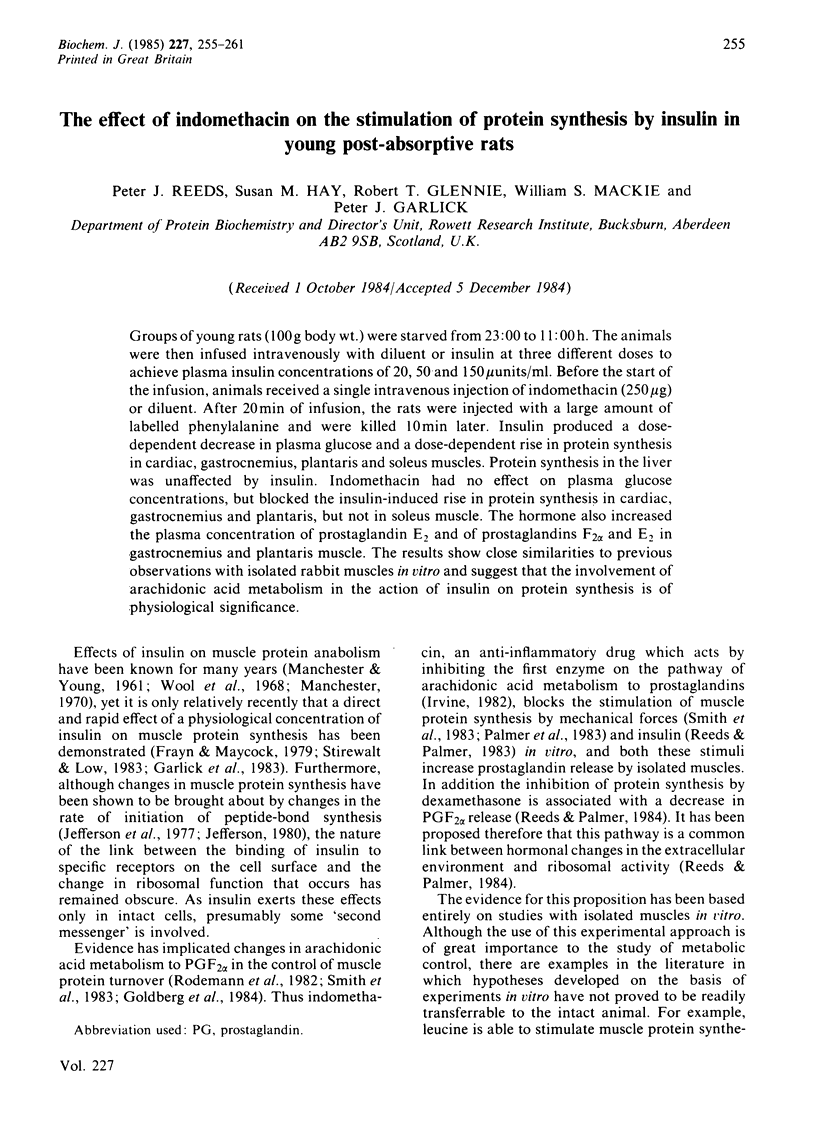
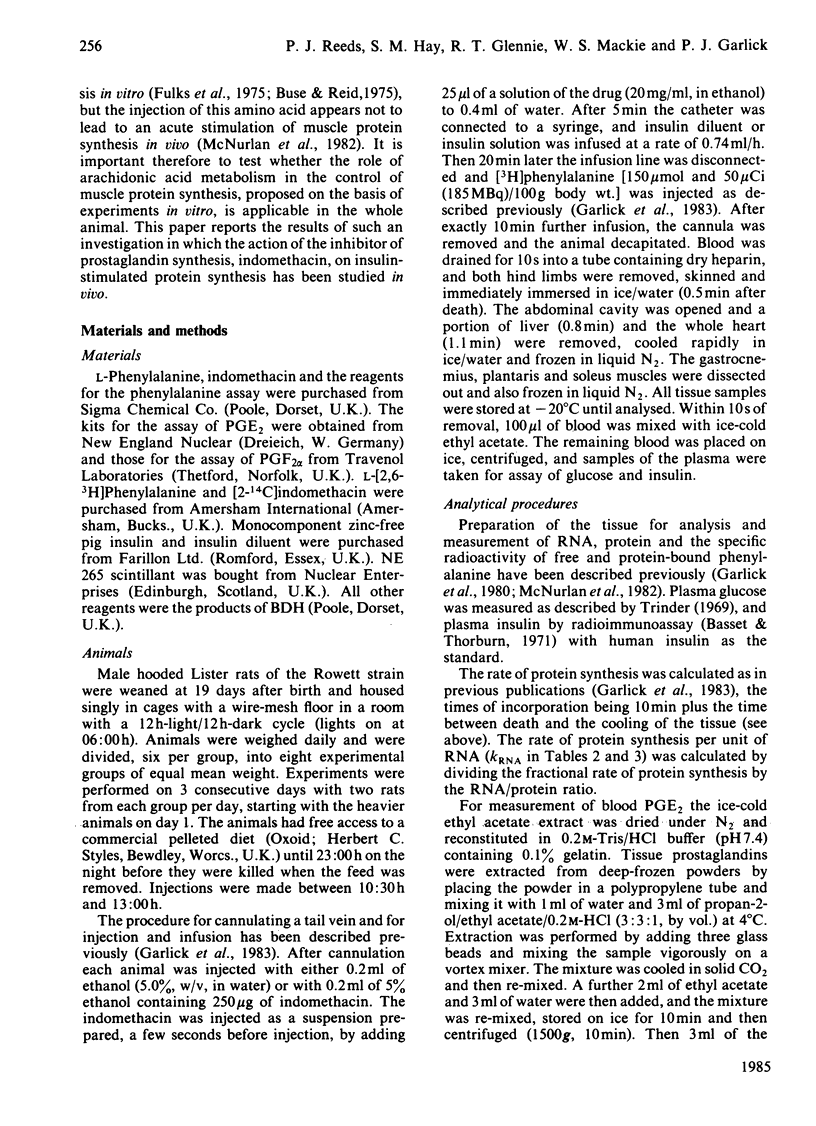
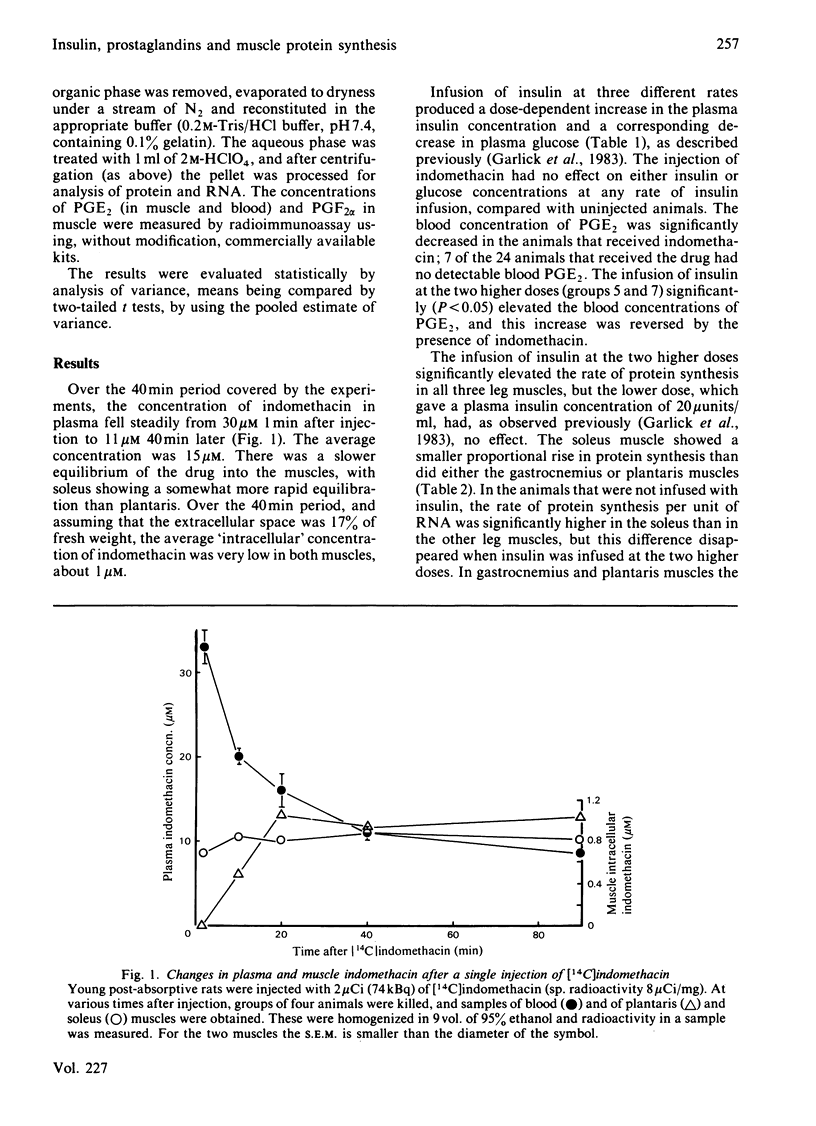
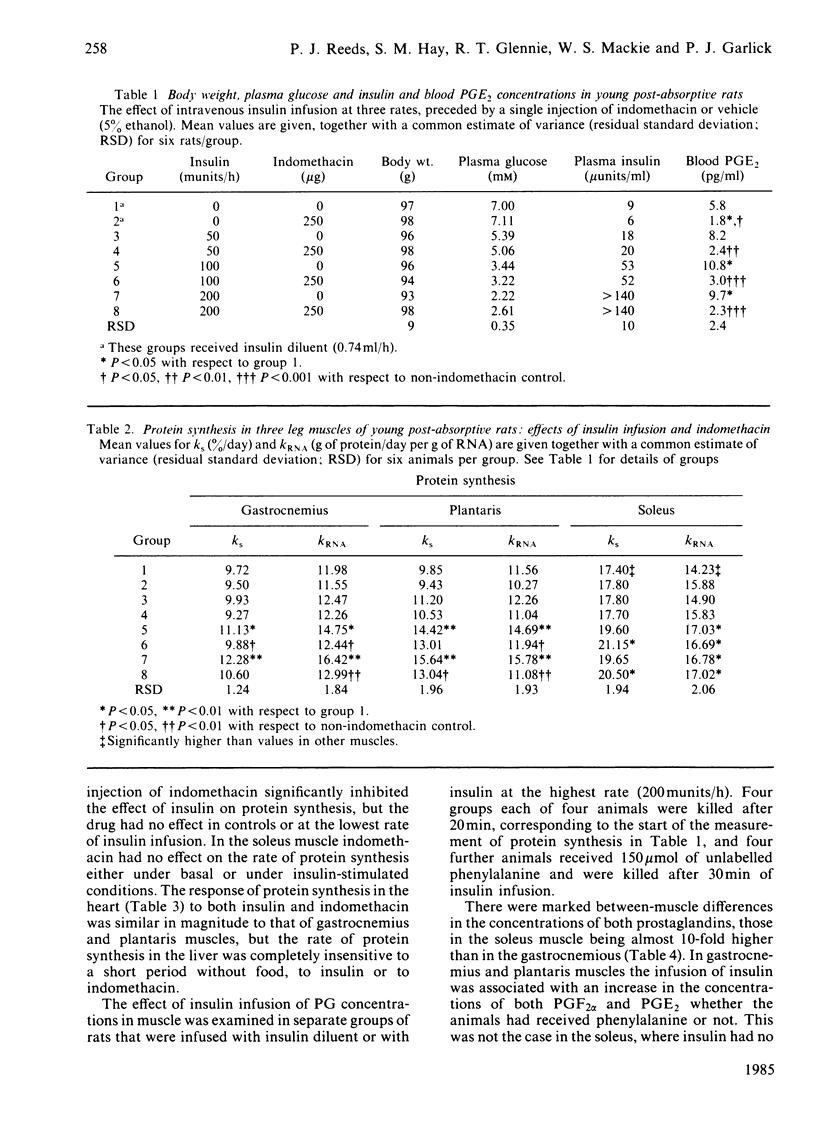
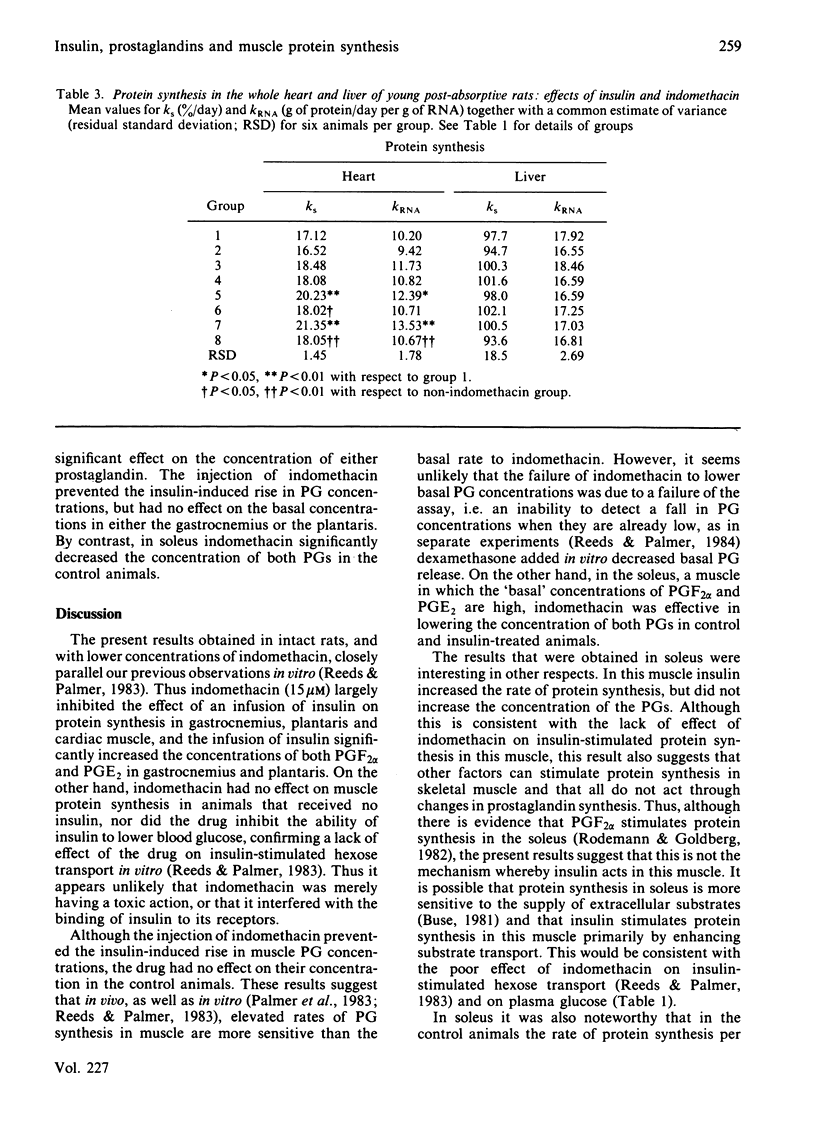
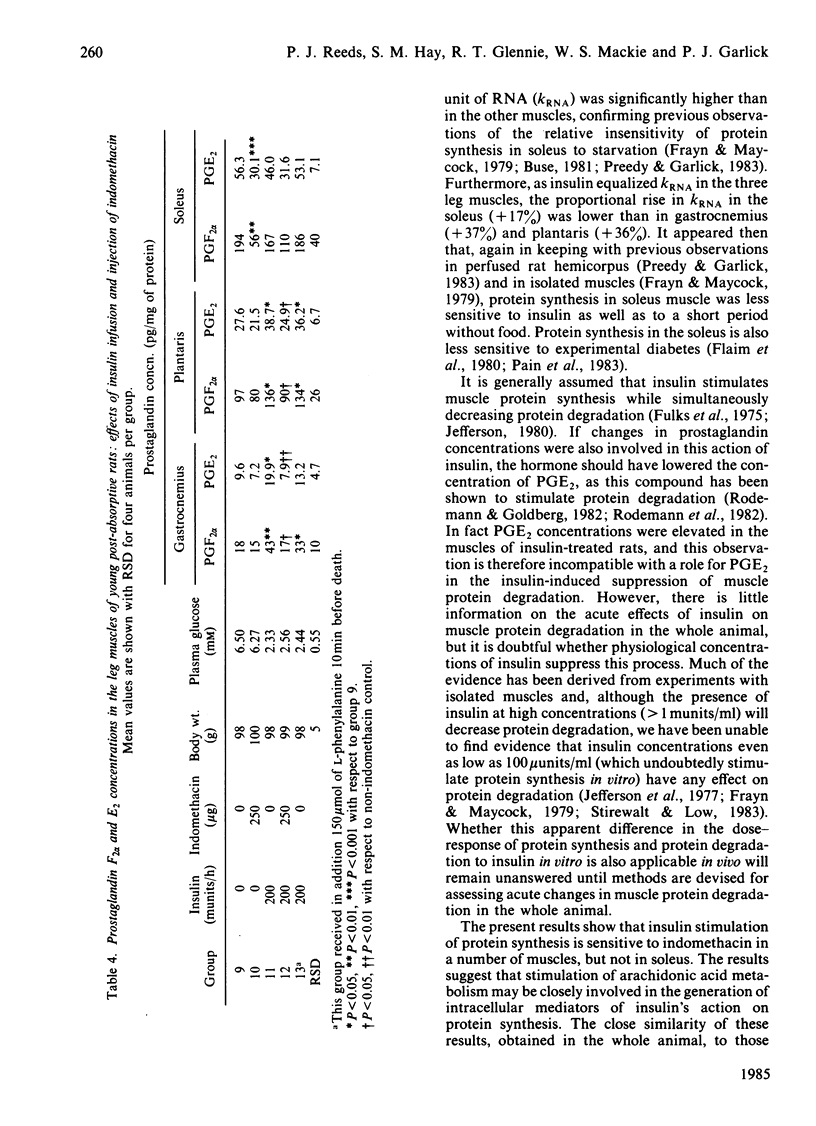
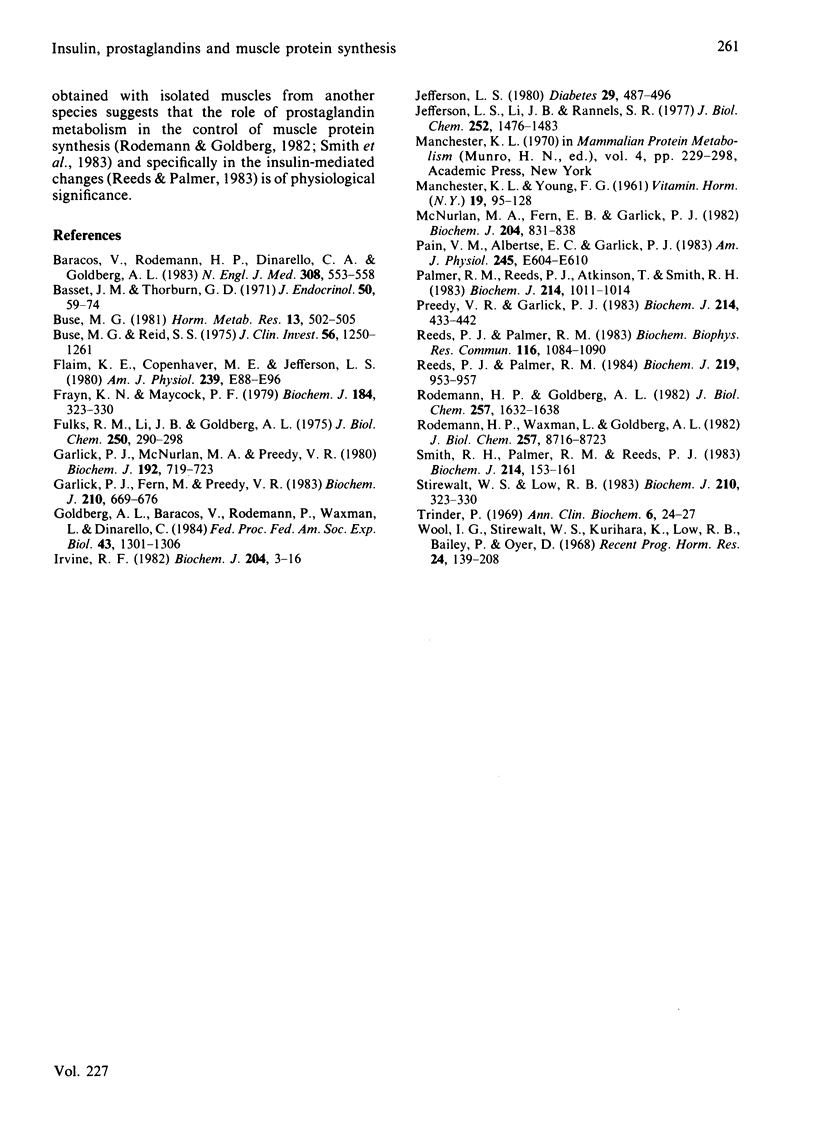
Selected References
These references are in PubMed. This may not be the complete list of references from this article.
- Baracos V., Rodemann H. P., Dinarello C. A., Goldberg A. L. Stimulation of muscle protein degradation and prostaglandin E2 release by leukocytic pyrogen (interleukin-1). A mechanism for the increased degradation of muscle proteins during fever. N Engl J Med. 1983 Mar 10;308(10):553–558. doi: 10.1056/NEJM198303103081002. [DOI] [PubMed] [Google Scholar]
- Bassett J. M., Thorburn G. D. The regulation of insulin secretion by the ovine foetus in utero. J Endocrinol. 1971 May;50(1):59–74. doi: 10.1677/joe.0.0500059. [DOI] [PubMed] [Google Scholar]
- Buse M. G. In vivo effects of branched chain amino acids on muscle protein synthesis in fasted rats. Horm Metab Res. 1981 Sep;13(9):502–505. doi: 10.1055/s-2007-1019316. [DOI] [PubMed] [Google Scholar]
- Buse M. G., Reid S. S. Leucine. A possible regulator of protein turnover in muscle. J Clin Invest. 1975 Nov;56(5):1250–1261. doi: 10.1172/JCI108201. [DOI] [PMC free article] [PubMed] [Google Scholar]
- Flaim K. E., Copenhaver M. E., Jefferson L. S. Effects of diabetes on protein synthesis in fast- and slow-twitch rat skeletal muscle. Am J Physiol. 1980 Jul;239(1):E88–E95. doi: 10.1152/ajpendo.1980.239.1.E88. [DOI] [PubMed] [Google Scholar]
- Frayn K. N., Maycock P. F. Regulation of protein metabolism by a physiological concentration of insulin in mouse soleus and extensor digitorum longus muscles. Effects of starvation and scald injury. Biochem J. 1979 Nov 15;184(2):323–330. doi: 10.1042/bj1840323. [DOI] [PMC free article] [PubMed] [Google Scholar]
- Fulks R. M., Li J. B., Goldberg A. L. Effects of insulin, glucose, and amino acids on protein turnover in rat diaphragm. J Biol Chem. 1975 Jan 10;250(1):290–298. [PubMed] [Google Scholar]
- Garlick P. J., Fern M., Preedy V. R. The effect of insulin infusion and food intake on muscle protein synthesis in postabsorptive rats. Biochem J. 1983 Mar 15;210(3):669–676. doi: 10.1042/bj2100669. [DOI] [PMC free article] [PubMed] [Google Scholar]
- Garlick P. J., McNurlan M. A., Preedy V. R. A rapid and convenient technique for measuring the rate of protein synthesis in tissues by injection of [3H]phenylalanine. Biochem J. 1980 Nov 15;192(2):719–723. doi: 10.1042/bj1920719. [DOI] [PMC free article] [PubMed] [Google Scholar]
- Goldberg A. L., Baracos V., Rodemann P., Waxman L., Dinarello C. Control of protein degradation in muscle by prostaglandins, Ca2+, and leukocytic pyrogen (interleukin 1). Fed Proc. 1984 Apr;43(5):1301–1306. [PubMed] [Google Scholar]
- Irvine R. F. How is the level of free arachidonic acid controlled in mammalian cells? Biochem J. 1982 Apr 15;204(1):3–16. doi: 10.1042/bj2040003. [DOI] [PMC free article] [PubMed] [Google Scholar]
- Jefferson L. S., Li J. B., Rannels S. R. Regulation by insulin of amino acid release and protein turnover in the perfused rat hemicorpus. J Biol Chem. 1977 Feb 25;252(4):1476–1483. [PubMed] [Google Scholar]
- Jefferson L. S. Lilly Lecture 1979: role of insulin in the regulation of protein synthesis. Diabetes. 1980 Jun;29(6):487–496. doi: 10.2337/diab.29.6.487. [DOI] [PubMed] [Google Scholar]
- McNurlan M. A., Fern E. B., Garlick P. J. Failure of leucine to stimulate protein synthesis in vivo. Biochem J. 1982 Jun 15;204(3):831–838. doi: 10.1042/bj2040831. [DOI] [PMC free article] [PubMed] [Google Scholar]
- Pain V. M., Albertse E. C., Garlick P. J. Protein metabolism in skeletal muscle, diaphragm, and heart of diabetic rats. Am J Physiol. 1983 Dec;245(6):E604–E610. doi: 10.1152/ajpendo.1983.245.6.E604. [DOI] [PubMed] [Google Scholar]
- Palmer R. M., Reeds P. J., Atkinson T., Smith R. H. The influence of changes in tension on protein synthesis and prostaglandin release in isolated rabbit muscles. Biochem J. 1983 Sep 15;214(3):1011–1014. doi: 10.1042/bj2141011. [DOI] [PMC free article] [PubMed] [Google Scholar]
- Preedy V. R., Garlick P. J. Protein synthesis in skeletal muscle of the perfused rat hemicorpus compared with rates in the intact animal. Biochem J. 1983 Aug 15;214(2):433–442. doi: 10.1042/bj2140433. [DOI] [PMC free article] [PubMed] [Google Scholar]
- Reeds P. J., Palmer R. M. Changes in prostaglandin release associated with inhibition of muscle protein synthesis by dexamethasone. Biochem J. 1984 May 1;219(3):953–957. doi: 10.1042/bj2190953. [DOI] [PMC free article] [PubMed] [Google Scholar]
- Reeds P. J., Palmer R. M. The possible involvement of prostaglandin F2 alpha in the stimulation of muscle protein synthesis by insulin. Biochem Biophys Res Commun. 1983 Nov 15;116(3):1084–1090. doi: 10.1016/s0006-291x(83)80253-8. [DOI] [PubMed] [Google Scholar]
- Rodemann H. P., Goldberg A. L. Arachidonic acid, prostaglandin E2 and F2 alpha influence rates of protein turnover in skeletal and cardiac muscle. J Biol Chem. 1982 Feb 25;257(4):1632–1638. [PubMed] [Google Scholar]
- Rodemann H. P., Waxman L., Goldberg A. L. The stimulation of protein degradation in muscle by Ca2+ is mediated by prostaglandin E2 and does not require the calcium-activated protease. J Biol Chem. 1982 Aug 10;257(15):8716–8723. [PubMed] [Google Scholar]
- Smith R. H., Palmer R. M., Reeds P. J. Protein synthesis in isolated rabbit forelimb muscles. The possible role of metabolites of arachidonic acid in the response to intermittent stretching. Biochem J. 1983 Jul 15;214(1):153–161. doi: 10.1042/bj2140153. [DOI] [PMC free article] [PubMed] [Google Scholar]
- Stirewalt W. S., Low R. B. Effects of insulin in vitro on protein turnover in rat epitrochlearis muscle. Biochem J. 1983 Feb 15;210(2):323–330. doi: 10.1042/bj2100323. [DOI] [PMC free article] [PubMed] [Google Scholar]
- Wool I. G., Stirewalt W. S., Kurihara K., Low R. B., Bailey P., Oyer D. Mode of action of insulin in the regulation of protein biosynthesis in muscle. Recent Prog Horm Res. 1968;24:139–213. doi: 10.1016/b978-1-4831-9827-9.50010-1. [DOI] [PubMed] [Google Scholar]


